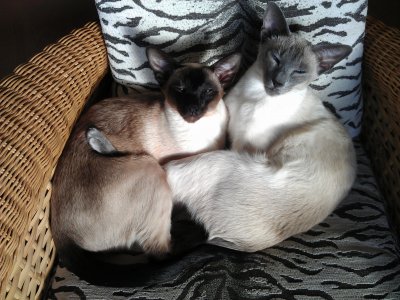- Joined
- Mar 21, 2018
- Messages
- 11
- Purraise
- 5
As long as your cat drinks enough water with a good dry food, then dry food is better. On the other hand, if your cat doesn't drink enough water, you're completely right, it leads to urinary problems. My pussies drink plenty of water, plus the chicken meat I feed them is quite moist.I have to respectfully disagree that dry food is better than canned food. I saw dry food give my cats urinary problems with my own eyes.








 When I adopted Lilly I didn't know anything about the Siamese breed. I have since learned that cross-eyedness and respiratory/allergy issues are quite common. Like your kitty, Lilly is also quite high-strung and does not like loud or sudden noises. She hates being picked up or held, but is otherwise very affectionate and sweet. I'm just so happy that her quality of life has improved to the point where my cat sitter is no longer afraid to look after her. The hacking episodes were so frequent and so violent, that the cat sitter freaked out and told me she could no longer agree to take care of her the couple times a year I go out of town. That has changed now.
When I adopted Lilly I didn't know anything about the Siamese breed. I have since learned that cross-eyedness and respiratory/allergy issues are quite common. Like your kitty, Lilly is also quite high-strung and does not like loud or sudden noises. She hates being picked up or held, but is otherwise very affectionate and sweet. I'm just so happy that her quality of life has improved to the point where my cat sitter is no longer afraid to look after her. The hacking episodes were so frequent and so violent, that the cat sitter freaked out and told me she could no longer agree to take care of her the couple times a year I go out of town. That has changed now. 

